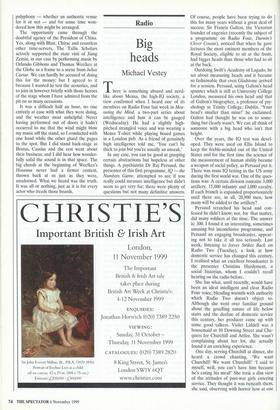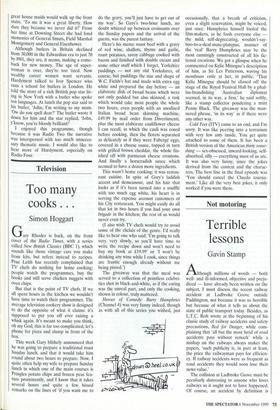Radio
Big heads
Michael Vestey
There is something absurd and nerd- like about Mensa, the high-IQ society, a view confirmed when I heard one of its members on Radio Four last week in Mea- suring the Mind, a two-part series about intelligence and how it can be gauged (Wednesday). He had a slightly high- pitched strangled voice and was wearing a Mensa T-shirt while playing board games in a London pub. As a friend of genuinely high intelligence told me, 'You can't be thick to join but you're usually an anorak.'
In any case, you can be good at grasping certain abstractions but hopeless at other things. A psychiatrist Dr Raj Persaud, the presenter of this first programme, IQ — the Numbers Game, attempted to see if you really could measure intelligence but didn't seem to get very far; there were plenty of questions but not many definitive answers.
Of course, people have been trying to do this for many years without a great deal of success. Sir Francis Galton, the Victorian founder of eugenics (recently the subject of a programme on Radio Four, Darwin's Clever Cousin), noticed that when he gave lectures the most eminent members of the Royal Society, eligible to sit at the front, had bigger heads than those who had to sit at the back.
Outdoing Swift's Academy of Lagado, he set about measuring heads and it became so fashionable that even Gladstone arrived for a session. Persaud, using Galton's head spanner which is still at University College London, measured his own head and that of Galton's biographer, a professor of psy- chology at Trinity College, Dublin. 'Your head's smaller than mine!' he exclaimed. Galton had thought he was on to some- thing but clearly wasn't. We can all think of someone with a big head who isn't that bright.
Over the years, the IQ test was devel- oped. They were used on Ellis Island to keep the feeble-minded out of the United States and for the first time the science of the measurement of human ability became a weapon of social policy, as Persaud put it. There was mass IQ testing in the US army during the first world war. One of the ques- tions was: A certain division contains 3,000 artillery, 15,000 infantry and 1,000 cavalry. If each branch is expanded proportionately until there are, in all, 20,900 men, how many will be added to the artillery?
Persaud scratched his head and con- fessed he didn't know; nor, for that matter, did many soldiers at the time. The answer is: 300. I found it an interesting, sometimes amusing but inconclusive programme, and Persaud an engaging broadcaster, appear- ing not to take it all too seriously. Last week, listening to Jeeves Strikes Back on Radio Two (Tuesday), a look at how domestic service has changed this century, I realised what an excellent broadcaster is the presenter Christina Hardyment, a social historian, whom I couldn't recall hearing on the radio before.
She has what, until recently, would have been an ideal intelligent and clear Radio Four voice, blending warmth with authority which Radio Two doesn't object to. Although she went over familiar ground about the gruelling nature of life below stairs and the decline of domestic service this century, her producer came up with some good talkers. Violet Liddell was a housemaid at 10 Downing Street and Che- quers for Churchill and Attlee. She wasn't complaining about her lot, she actually found it an enriching experience.
One day, serving Churchill at dinner, she heard a crowd chanting, 'We want Churchill! We want Churchill!' I said to myself, well, you can't have him because he's eating his meal!' She took a dim view of the attitudes of post-war girls entering service. They thought it was beneath them, she said, observing with horror how at one great house maids would walk up the front stairs. 'To me it was a great liberty. How dare they because we never did it!' From her time at Downing Street she had fond memories of General Smuts, Field Marshal Montgomery and General Eisenhower.
Although butlers in Britain declined from 30,000 in the Edwardian era to just 70 by 1981, they are, it seems, making a come- back for new money. The age of super- woman is over, they're too tired. Now wealthy career women want servants. Hardyment talked to Ivor Spencer who runs a school for butlers in London. He told the story of a rich British pop star liv- ing in New York with a butler who spoke ten languages. At lunch the pop star said to his butler, 'John, I'm writing to my mum. 'Ow do you spell dear?' The butler wrote it down for him and the star replied, 'John, Y'know, you're bloody brilliant!'
I enjoyed this programme, though because it was Radio Two the narrative was interspersed with too much unneces- sary thematic music. I would also like to hear more of Hardyment, especially on Radio Four.



























































































 Previous page
Previous page